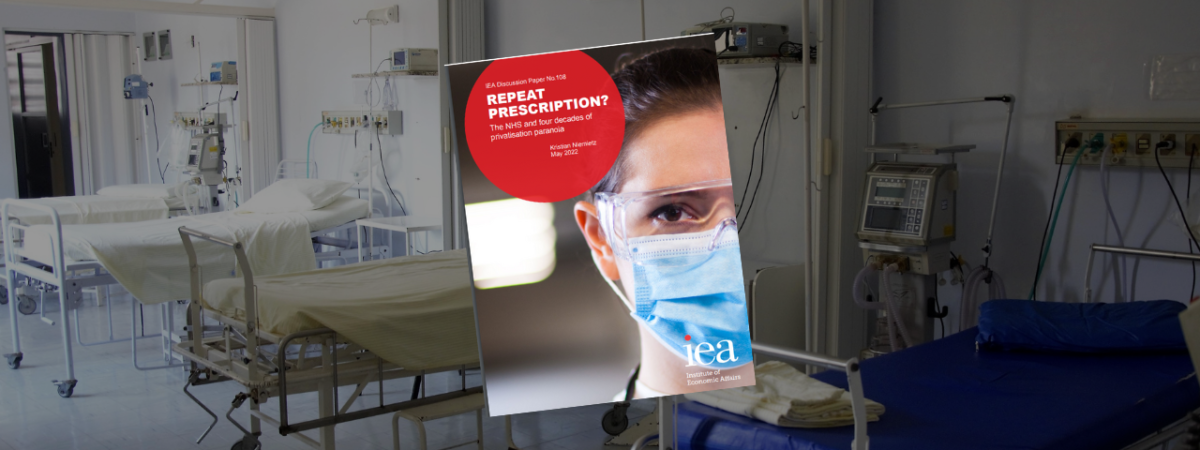Moral panics and conspiracy theories around NHS “privatisation” (Part 1)
SUGGESTED



I recently read a novel which told the story of a murder in reverse-chronological order. It starts with a woman witnessing a murder. The next day, she wakes up, and realises that she has somehow travelled a day back in time. She doesn’t know how that happened, and it doesn’t really matter for the purposes of the story. The point is that the murder hasn’t happened yet. She can still prevent it. In order to do so, she needs to find out what caused it.
She doesn’t find that out on that day. But when she wakes up again, she realises that she has travelled yet another day back in time. Then this happens again, and again, and again… She goes back further and further in time, until she finally finds the origin – the event that originally triggered the murder.
I will structure this presentation in a similar way. I will start in the present, and I will then, step by step, move backwards in time, in search of the origin of this popular idea that there is a secret plan to privatise the NHS by stealth.
The moral panic du jour
A few examples of what I’m talking about. The NHS campaigner Dr Julia Grace Patterson recently tweeted:
“They’re privatising the NHS. […] And they’re gaslighting the campaigners speaking up, denying they’re doing it.”
She tweets some variation of this every day, and several times a day. Amazingly, her fans never get bored with it. On the contrary: they lap it up every time. She always gets thousands, sometimes tens of thousands, of likes and retweets.
Then there’s trade union leader Mick Lynch, whom some see as “the new Corbyn”, who also talks about how “we’ve got to stand up to the NHS being privatised”. And there’s the Queen of Twitter, the MP Zarah Sultana from the Socialist Campaign Group, who also says: “They want to break it [the NHS] up, piece-by-piece, privatising it by stealth.”
A petition against this imaginary privatisation of the NHS recently received over 137,000 signatures – that’s more than the population of Cambridge. Which is quite remarkable for a complete non-event.
2016-2021: the UK-US trade deal
The current moral panic is, of course, not the first one of its kind. Remember how, just a few years ago, everyone was panicking about the proposed UK-US trade deal, because it was allegedly a Trojan Horse for the privatisation of the NHS?
Proponents of that idea never quite explained how this was supposed to work, because that it not what trade deals do. We have a trade deal with France (via the EU), but that doesn’t mean that we get to buy the Eiffel Tower. Whether we want to have a state-owned health service or not is a domestic political decision, which is completely independent of what trading arrangements we have.
But however absurd, the idea was hugely popular at the time. The Independent – which, nowadays, is just a slightly upmarket version of the Canary – regularly ran headlines such as “Trump is here to help carve up the NHS in a post-Brexit deal – that’s the real story behind his visit”. The Leader of the Opposition said that “Boris Johnson’s trade deal with Trump would see our NHS sold off to US corporations.” A petition entitled “Keep our NHS out of trade deals” was signed by over 1.4 million people. According to once survey, nearly 60% of the public believed that a trade deal with the US would pose “a significant risk” to the NHS.
2010 – 2016: the Health and Social Care Act
But this wasn’t the first moral panic of its kind either. It just replaced the previous one, namely the moral panic around the Health and Social Care Act 2012, which was also decried as a Trojan Horse for the privatisation of the NHS.
It was, of course, no such thing. The HSCA was mainly just another reorganisation of the NHS. However, it did have a provision about increasing the use of competitive tendering, which could, in principle, have led to more services being contracted out to the private sector. A decade on, we can say that, yes, it seems to have had that effect – but only on a fairly minor scale. The number of contracts going to private healthcare companies went up, but most of those contracts only involved relatively small sums of money, so the total proportion of the NHS budget spent on private providers did not increase very much. Also, all of that increase occurred around the time the HSCA took effect. It did not increase any further from there; if anything, it slightly decreased again in recent years. We can disagree whether the HSCA was good or bad, that’s not my point here. The point is that it was clearly never a plan for “creeping privatisation”, and there was never a rational reason for believing it would be.
But in the first half of the 2010s, nearly everyone who commented on the subject was convinced that it was. The New Statesman, the Independent and the Guardian published dozens of articles with titles such as “The NHS is on the brink of extinction”. And it was not just left-wing hacks who made such claims, but leading members of the medical establishment. The deputy chair of the British Medical Association claimed that in “as little as five years”, the NHS would be gone in all but name. That would have been by 2019. Of course, in 2019, he still repeated that same prophecy, just quietly shifting the date further into the future.
Several books with titles such as The Plot Against the NHS and How to Dismantle the NHS in 10 Easy Steps came out. The latter, hilariously, now has a second edition, which is a bit self-defeating: a book which predicts a specific event is not supposed to have a “second edition”. The event you predicted either happens, in which case you don’t need a second edition, because if the event has already happened, you no longer need to predict it. Or the event doesn’t happen, in which case you shouldn’t write a second edition either, because it means that you were wrong.
2007 – 2010: the random panics of the Brown years
Up until this point, it may seem as if these moral panics occur when we have a Conservative government, and that they are simply a reflection of the fact that people don’t trust the Conservatives on the NHS.
But this is not simply a party-political issue. Let’s go back a few years further back in time. Even in the Brown years, you could regularly find pieces in the Guardian and the Independent – but also in peer-reviewed academic journals – about the “creeping privatisation” of the NHS. The moral panics of the Brown years were more random and unfocused. Rather than one big moral panic, there were several mini-panics, without much of a common theme. But they were there, which is remarkable given that during those years, the financial crisis crowded out almost everything else.
But the history of moral panics around the NHS didn’t start in the Brown years either. Let’s go a bit further back in time.
Continue to part 2




